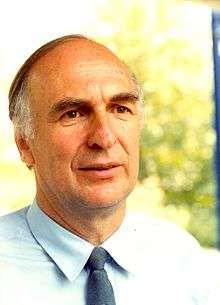Wolfgang Steglich
Wolfgang Steglich (born 12 August 1933) is a German chemist .
Wolfgang Steglich | |
|---|---|
 Wolfgang Steglich | |
| Born | 12 August 1933 |
| Nationality | German |
| Alma mater | Technical University of Munich |
| Known for | Natural products chemistry, 4-dimethylaminopyridine (DMAP), Strobilurins |
| Awards | 1986 Emil Fischer medal, Society of German Chemists; 1989 Adolf Windaus medal, University of Göttingen; 1996 Honorary Professor of the Shanghai Institute of Materia Medica, Chinese Academy of Sciences; 1996 Karl Heinz Beckurts award together with Prof. Dr. Timm Anke; 1997 Richard Kuhn medal, Society of German Chemists; 1998 honorary degree, Humboldt University of Berlin; 2000 Federal Cross of Merit on Ribbon. |
| Scientific career | |
| Fields | Organic chemistry, natural products chemistry, fungal secondary metabolites |
| Institutions | Technical University of Munich (1958-1960), Imperial College London (1961), Technical University of Munich (1962-1971), Technical University of Berlin (1971-1975), University of Bonn (1975-1991), University of Munich (1991-2001) |
| Doctoral advisor | Friedrich Weygand |
Life
Wolfgang Steglich was born in Kamenz and studied chemistry at the Technical University of Berlin and later at the Technical University of Munich where he received his PhD in 1960 for work with Friedrich Weygand. Following a postdoc stay with Sir Derek H. R. Barton at the Imperial College London, Wolfgang Steglich completed his habilitation at the Technical University of Munich. After Friedrich Weygand's decease in 1969, [1] Steglich was in charge of the Weygand chair until he became a full professor at the Technical University of Berlin in 1971. In 1975, he was appointed a professorship at the University of Bonn. He succeeded Rolf Huisgen as head of the organic chemistry department of the University of Munich in 1991. Wolfgang Steglich retired in 2001.[2]
Work
The use of 4-dimethylaminopyridine for esterifications with anhydrides,[3] which is sometimes called the Steglich esterification, his studies on the metabolism of fungi, [4] [5] and, in collaboration with Timm Anke, the structure eludication and chemical synthesis of the antifungal Strobilurins [6] that resulted in the industrial development of the novel class of Strobilurin-based crop protection agents [7] are his main contributions in the field of chemistry.
References
- Helmut Simon, Wolfgang Steglich (1970). "Nachruf Friedrich Weygand (mit Schriftenverzeichnis)". Z. Naturforsch. 25B (2): 126–133.
- (a) Website Prof. Dr. W. Steglich, University of Munich, with short CV (English), archived from the original on 12 September 2019, retrieved 12 September 2019; (b) Website Prof. Dr. W. Steglich, University of Munich, CV (German), archived from the original on 12 September 2019, retrieved 12 September 2019.
- Gerhard Höfle, Wolfgang Steglich, Helmut Vorbrüggen (1978). "4-Dialkylaminopyridines as Highly Active Acylation Catalysts". Angew. Chem. Int. Ed. Engl. 17 (8): 569–583. doi:10.1002/anie.197805691.CS1 maint: multiple names: authors list (link)
- Wolfgang Steglich (1975). "Pilzfarbstoffe". Chem. U. Z. 9 (4): 117–123. doi:10.1002/ciuz.19750090404.
- Melvyn Gill, Wolfgang Steglich (1987). "Pigments of Fungi (Macromycetes)". Progr. Chem. Org. Nat. Prod. 51: 1–317. doi:10.1007/978-3-7091-6971-1. ISBN 978-3-7091-6971-1.
- Hubert Sauter, Wolfgang Steglich, Timm Anke (1999). "Strobilurins: Evolution of a New Class of Active Substances". Angew. Chem. Int. Ed. Engl. 38: 1328–1349.CS1 maint: multiple names: authors list (link) (online)
- Peter Jeschke, Matthias Witschel, Wolfgang Krämer, Ulrich Schirmer (eds.), Modern Crop Protection Compounds, 3rd edition, Wiley-VCH, 2019, ISBN 978-3-527-34089-7.
Literature
- Klaus Roth (2015). "Pilzragout nach Chemiker-Art – Es kochen Maître Steglich und seine Küchenbrigade". Chem. U. Z. 49: 196–212. doi:10.1002/ciuz.201500712.
- Jeffrey I. Seeman (2017). "R. B. Woodward's Letters: Revealing, Elegant and Commanding, see chapter, 'Another Chemistry Letter to a Young Student'". Helv. Chim. Acta. 100: e1700183. doi:10.1002/hlca.201700183.